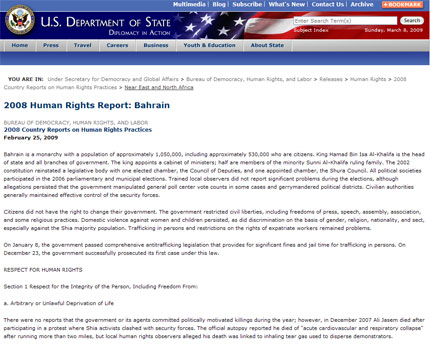
|
 |
 |
|
|
|
|
|
|
|
|
|
|
|
|
|
|
|
|
|
|
|
|
|
|
Bahrain in the Report of the U.S. State DepartmentThe U. S. Department of State released their annual human rights report last February which covers all countries in the world. With regards to Bahrain, the report was extensive and balanced in its presentation of the issues, transformations, achievements and failures in the country. Regarding the respect for human dignity, the report said that there were no reports that Bahrain's government or its agents committed politically motivated killings during the year. However, the report did mention the death of Jasem Ali in 2007, and said that the official autopsy reported that he had died of 'acute cardiovascular and respiratory collapse' after running for more than two miles. The report continued by saying that in January, the government passed comprehensive anti-trafficking legislation that provides for significant prison sentences and fines for those who commit the crime. On 23 December 2008, the government successfully prosecuted its first case under this law. With regard to torture, the report pointed to the unconfirmed allegations of torture, referring to the medical team formed on 6 and 9 April to investigate those allegations, which did not prove or disprove the defendants' accusations of abuse. As for prison and detention centre conditions, the report stated that they generally met international standards, although the government did not permit any independent inspections. Throughout the year, some detainees alleged that they had been subjected to physical abuse by prison guards, a charge that the government denied. The report also mentioned the quasi-governmental Supreme Council for Women's (SCW) recent visit to the women's prison in Bahrain. However, SCW did not issue a public report on the results of the visit. There have also been many visits by the International Committee of the Red Cross (ICRC) and it has been reported that ICRC officials had not visited the prisons since the release of political prisoners in 2000.
The report added that a widespread lack of transparency in the security services made corruption in the security services difficult to assess, but said that the Minister of Interior had announced on 22 November 2008 that he had disciplined 23 police officers during the year for committing human rights abuses. On the other hand, on 30 July 2008, the King announced an amnesty for nearly 225 prisoners, including many charges for rioting. The government required those arrested for rioting to sign a pledge not to riot again. Seventy individuals refused to sign the pledge, yet they were released on 02 August. Regarding trials, the report said that the Bahrain's Constitution provides for an independent judiciary. Several accused have been jailed with terrorism charges during the year, and the government lost appeals calling for tougher sentences. There were also allegations of corruption in the judicial system. However, the report noted that there is no evidence to support those allegations. The report confirms that there were no reports of political prisoners or detainees. As for freedom of speech and press, it states that there was considerable freedom of expression on the internet, letters to the Editor, and occasionally, on state run television, adding that the government practices censorship and actively monitors and blocks local stories on sensitive matters, especially those related to sectarianism and national security and criticism of the Bahraini and Saudi royal families. Journalists also practiced widespread self-censorship, and according to some members of the press, government officials contacted editors directly and asked them to stop writing about certain subjects or asked them not to publish a press release or story. On the issue of the right of assembly, the report affirms that anti-government demonstrations occurred in numerous Shia villages around the country on an almost weekly basis this year. Bands of Shia youth regularly appeared at the end of both registered and unregistered demonstrations, burning tires and trash and threw Molotov cocktails and stones at riot police. The report indicated that a number of political societies accused the government of using tear gas and excessive force against demonstrators, while the government says that it intervenes only to curb the riots. The report also said that government and societal discrimination remained a problem in the country. However, the report referred to the government's efforts in increasing the employment of the Shia in different locations in the Ministry of the Interior, while the private sector continues to employ low-paid Shia. Finally, For human rights organizations, the report pointed to their political orientation, and pointed out that the government allowed the Bahraini organizations to interact with their international counterparts, and that during the past year the government allowed for the members of Amnesty International to exercise their activities without interference, despite their failure to register officially as NGO. Comment by BHRM:It is evident that the U.S. annual report contains many positive and negative indications. It sends out a message to those concerned with human rights in Bahrain in particular, and requires objective and transparent assessment, in order to truly benefit from its comprehensive overview of development in the last year; to build upon what has already been achieved, and to address the deficiencies and shortcomings in the performance of the government and human rights organizations. It is incorrect to use isolated sections of the report selectively to serve certain political agenda in which each party uses the report to its own advantage, away from the central issue which is the development of the human rights situation in Bahrain. |
